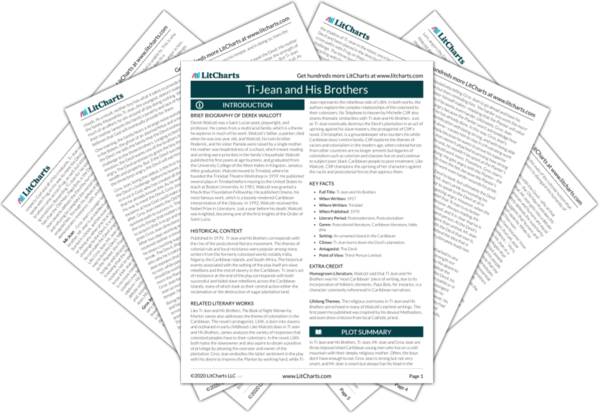The antagonist of Ti-Jean and His Brothers is the Devil himself, who challenges three young men to a dangerous bet. Ti-Jean and his two older brothers live in poverty, and the Devil promises them that whoever among them can cause him to lose his temper will receive wealth and property. However, if the Devil succeeds in making one of the brothers angry, he gets to eat him. As the three brothers navigate this challenging situation, they demonstrate varying understandings of religion and faith. While Ti-Jean has an understanding of faith that gives him courage and strength to face the Devil, his two brothers have more negative understandings of religion that end up limiting them. Through demonstrating the ways in which Ti-Jean’s faith helps him to beat the Devil, Walcott stresses the power of steadfast religious belief even in the face of bleak circumstances.
Gros Jean and Mi-Jean’s faith seems to depend upon external evidence of God acting in their lives, and therefore their belief in God wavers when this evidence is missing. However, Ti-Jean has a faith that is deeper than either of his brothers’, one that doesn’t depend on external evidence of God’s care or love. At the beginning of the play, Ti-Jean’s family is lamenting their poverty. Ti-Jean’s faithful mother tells her boys to “Wait, and God will send [them] something.” But neither Gros Jean nor Mi-Jean is convinced. Gros Jean responds, “God forget where he put us,” and Mi-Jean says, “God too irresponsible.” In both cases, the brothers feel that God is not present in their lives—either because he simply forgot to care for them, or because he is aware but incapable of caring for all of his creations. What’s important about the both brothers’ insistence that God is not engaged with their lives is that they assume God’s presence manifests as something material. In other words, in order to have faith, both Gros Jean and Mi-Jean need to see external evidence that God is real, present, and benevolent.
Ti-Jean, on the other hand, has a faith stronger than that of his brothers. His belief in God doesn’t depend on any external circumstances. Rather, he says, “Whatever God made, we must consider blessed.” This suggests that Ti-Jean is able to accept the world as it is, without assuming that bleak circumstances are reason to give up belief in God, or evidence that God does not exist. Ti-Jean’s faith is something that he learned from his mother, who tries to impart lessons of faith to each of her sons before they leave. Ti-Jean is the only one who listens. When Gros Jean leaves home to go and fight the Devil, his mother tells him, “Praise God who make all things,” and Gros Jean insists that he already knows this. However, immediately after he leaves, he comes across Frog, one of the talking animals who dwell in the forest nearby. Frog offers each of the brothers advice as they depart. Gros Jean says to Frog, “Get out of my way, you slimy bastard! How God could make such things?” This reflects the fact that, contrary to what he told his mother, he does not “already know” to praise God and all of the things that he has made. What’s more, he demonstrates that he thinks himself superior—for being human, for being a strong man—to other creations that God has made. This demonstrates again that Gros Jean’s relationship with God is material—he judges animals for their appearance and is preoccupied with his place in a superficial hierarchy.
By contrast, Ti-Jean demonstrates that he does appreciate all of God’s creatures. Because he genuinely values God’s work and maintains his faith, he stops to talk to Frog and the other creatures instead of insulting or ignoring them, as Mi-Jean and Gros Jean have done. The creatures tell Ti-Jean to beware of the Old Man who tricked both of his brothers—and who turns out to be the Devil himself. Because Ti-Jean knows that the Old Man is really the Devil in disguise, he sees through his manipulations and is eventually able to defeat the Devil. In this way, Ti-Jean’s willingness to believe in God and to put the spiritual teachings he has learned into practice helps to save his life.
Gros Jean and Mi-Jean are concerned with external manifestations of God’s love, and don’t have faith if they don’t see such evidence. While they are looking for this evidence, however, they forget to put into practice the spiritual teachings their mother has passed on to them, which causes them to lose their lives—had they truly appreciated all of God’s creatures, like Ti-Jean does, it’s likely that the animals would have warned them, too, about the Devil. However, Ti-Jean is willing to trust so deeply in God that he doesn’t need material evidence of God’s work, and therefore is able to put into practice important spiritual teachings. This, ultimately, enables him to defeat the Devil, demonstrating the power of faith.
The Power of Faith ThemeTracker

The Power of Faith Quotes in Ti-Jean and His Brothers
MOTHER: Wait, and God will send us something.
GROS JEAN: God forget where he put us.
MI JEAN: God too irresponsible.

Unlock explanations and citation info for this and every other Ti-Jean and His Brothers quote.
Plus so much more...
Get LitCharts A+“Get out of my way, you slimy bastard! How God could make such things?”
“A man is no better than an animal. The one with two legs makes more noise and that make him believe he can think.”











